Welcome to the Washington University School of Medicine
in St. Louis Dis-Orientation Guide!
The official student-produced guide to our school, city, and life in medical school.
The Dis-Orientation (Dis-O) Guide is here for you as you enter medical school. Dis-O serves to introduce you to the ins and outs of life as a medical student at WashU Med. Each Dis-O Guide is a snapshot in time crafted by the M1 class. If you are curious about perspectives from classes that came before, the Dis-O digital archives contain Dis-O Guides going back 10 years.
Before you enter the 2024-2025 guide, our dean of the medical school, associate dean for student affairs, associate dean for admissions, assistant dean for admissions, and associate dean for diversity warmly welcome you to the Washington University School of Medicine in St. Louis.
All of us (from M1s to M4s, lecturers to thread leads, and all of our staff and deans) want to help you succeed and achieve your goals. We also want your time in medical school to be one of delight as much as it is transformative.
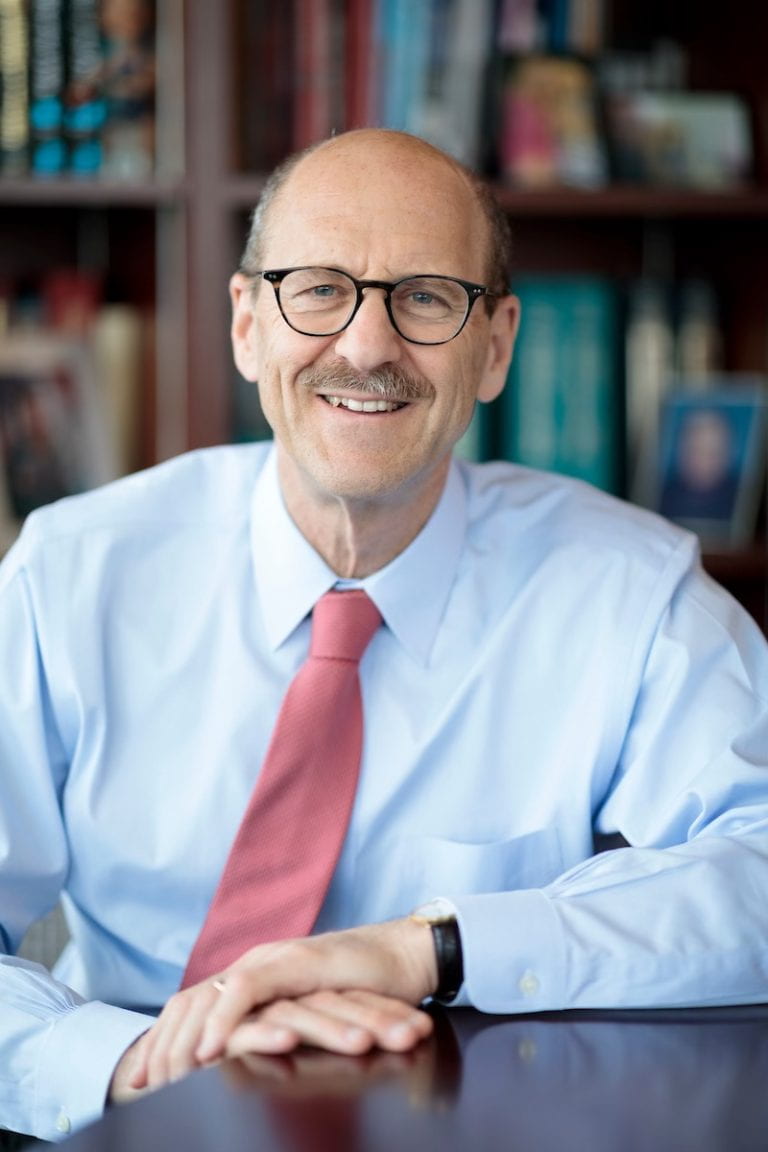
From David H. Perlmutter, MD
Dear Members of the Entering Class of 2024,
Welcome to Washington University School of Medicine.
You were each selected from a highly gifted pool of applicants based on what we believe is your potential to be one of the health care leaders of tomorrow. But just as importantly, you chose us. We are extremely fortunate that you have decided to begin your medical career at our school, where you’ll find a medical program designed to support your unique talents and goals.
The school’s mission — to conduct groundbreaking research, provide skilled and compassionate patient care and prepare the next generation of leaders in biomedicine — is complex, and its success requires the dedication of the community of scholars of which you are now a part.
As you experience the challenges and rewards of medical school, you’ll be surrounded by a diverse group of peers with extraordinary talents and abilities, as well as distinct perspectives. You will learn with them and from them as you form connections that will influence your personal and professional pursuits for years to come.
One of the School of Medicine’s greatest strengths is its faculty, whose members have an impact that reaches far beyond our school, into our community and communities around the world. They have chosen Washington University, as well, as the institution where they work to promote the mission of health care by training the next generation of physicians and scientists.
Mentorship is one of the hallmarks of the school, and students consistently cite their interaction with faculty as a highlight of their experience here. As you take your place within our collaborative learning environment, you’ll be encouraged to use your talents and time to advance science and serve others.
Like the school itself, the city of St. Louis is rich in culture and history, and it serves as an ideal location for you to gain an understanding of the challenges of modern medicine. Step outside familiar learning spaces and immerse yourself in the city’s diverse communities, many affected by disparities in health care.
You have chosen to begin this significant chapter of your life at an institution committed to helping you acquire the knowledge and skills you’ll need to achieve your full potential. I first chose the School of Medicine as a faculty member, and now I’m honored to lead this exceptional institution. Together, we will shape the future of medicine.
Best Wishes,
David H. Perlmutter, MD
Executive Vice Chancellor for Medical Affairs
Spencer T. and Ann W. Olin Distinguished Professor
George and Carol Bauer Dean, School of Medicine
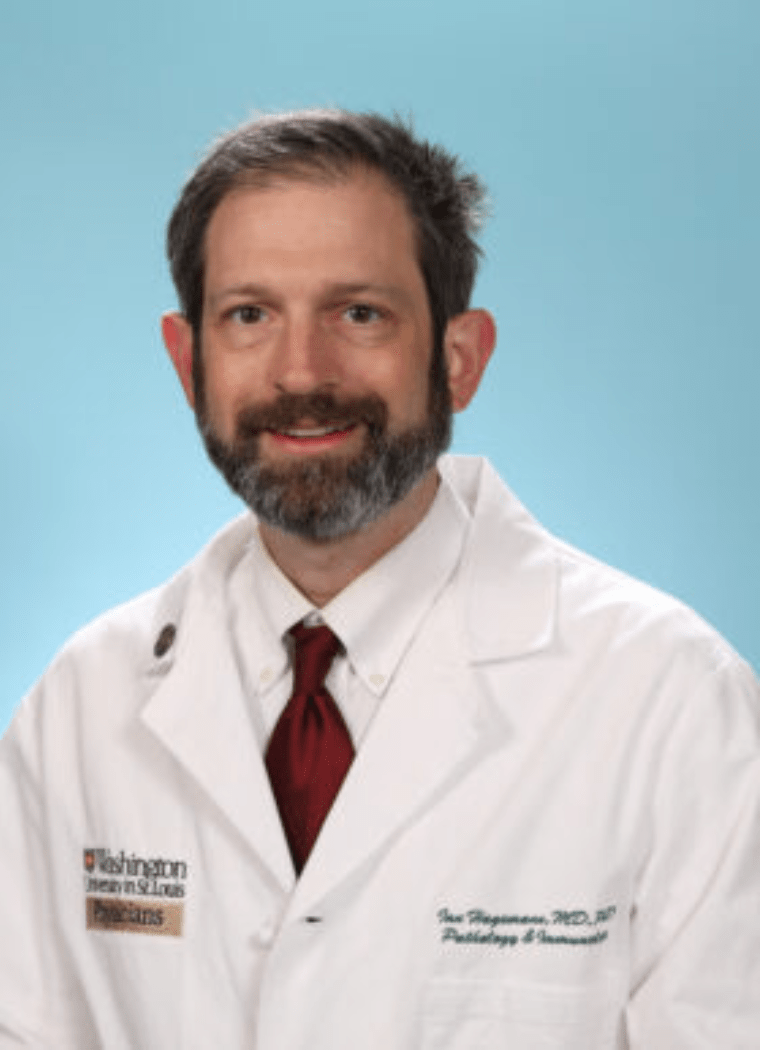
From Ian S. Hagemann, MD, PhD
Welcome to Wash U! When my wife, Andrea, and I were medical students, we used to laugh at our lecturers who described themselves as “WUMS 24” (this means a 24th-year WashU medical student). Now, we are those people.
Some things were different 20 years ago. There were a LOT of lectures, usually three hours in the morning and three in the afternoon, unless we had lab or small group, which we also had a lot. Erlanger Auditorium didn’t have enough seats, so some of us would sit in the aisles because we all came to class. There was no video recording, but we made an audiotape, which someone would have to remember to flip halfway through the hour. Then someone in the class would type out the text, and we would get a printout in our mailbox.
Some things weren’t different at all. The gross anatomy lab has been frozen in time for decades. Forget about any “dungeon” stereotypes. The lab is on the top floor of one of our historic buildings and has windows on three sides that we used to open on nice days. If your eyes get blurry from too much dissection, you can look up at the teaching specimens that people have collected over the years. Then you can get back to rolling up little bits of fascia to make those nerves you couldn’t find before.
Back when I was an applicant, I heard that WashU wanted students with high grades and scores. This never quite made sense, since it seemed like high scores would help an applicant gain acceptance at any number of schools, among which they could then choose. The reality is that assembling our medical school class is a holistic process. WashU is looking for students who are well-balanced and who have amazing gifts that they will contribute to the future of medicine. Our students are very active and creative. The culture here is very collaborative, and we help each other to improve. I often say that at WashU, there are enough cookies for everyone. This collaborative feeling is the reason I am still here after more than 20 years. The faculty and our education team are here to support you, and you will also find that your classmates are supportive, inspiring, and exciting to be around.
There are lots of great medical schools, but WashU is special because of our people and community. I hope you will see yourself as belonging to this family. Someday, you, too, will be able to reminisce about how things have changed and how they have stayed the same.
Ian S. Hagemann, MD, PhD
Assistant Dean for Admissions
Associate Professor of Pathology and Immunology
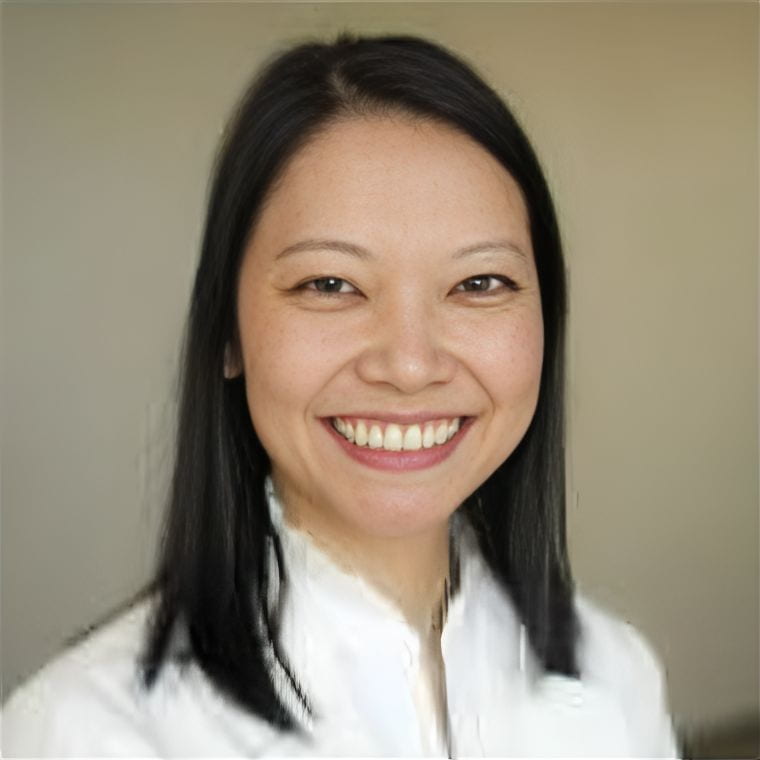
From Tammy Sonn, MD
Welcome to WashU School of Medicine! There is no way you are here by chance. You have worked so hard and for so long to be here today, and we are excited to have you be a part of our family.
Your Student Affairs office is here to support you in every way we can. Our student body is amazing and provides you with the most updated information about all the “nooks and crannies” of who we are from peer perspectives!
Medical school isn’t exactly easy, which is why the biggest source of support is from each other. This will usually feel like peers in your medical school class but also includes your faculty and your administrative staff who are here to support you, teach you, and mentor you. We can’t do this adventure alone, but we can do it with support from the community around you. We’re here to help be your surrounding community.
We have deliberately crafted a wellness program designed to address eight key dimensions that any student may need to engage in a healthy journey through medical school. Activities and functions that exist through our Academic Societies, Medical Student Government, and student-led organizations, in addition to our departmental and faculty resources, are all interwoven into these wellness domains. We have a lot of resources we hope you will explore online on our website.
- Intellectual
- Emotional
- Spiritual
- Physical
- Social
- Occupational/Vocational
- Environmental
- Financial
Never hesitate to reach out via email or in person — we’re located inside Becker Library on the third floor. If you’re ever wondering about your resources or whom to contact, we are here for you and will help direct and guide.
Our Office of Student Affairs includes:
- Dr. Wallace — Assistant Dean of Student Affairs
- Dr. Diemer — Assistant Dean of Career Counseling
- Brady Griffith — Senior Manager, Student Life
- Angie MacBryde — Career Counseling Program Coordinator
- Miranda Paulos — Student Life Coordinator
- Kayla Young — Project Coordinator
- Jaye Maggiolo — Executive Secretary
Our team can’t wait to engage and interact with each of you. We are here to support you, so let us be partners together to help you begin your professional medical journey.
We look forward to having the vibrant world of WashU Med student life include you!
Tammy Sonn, MD
Associate Dean for Student Affairs
Vice Chair for Education
Professor of Obstetrics and Gynecology
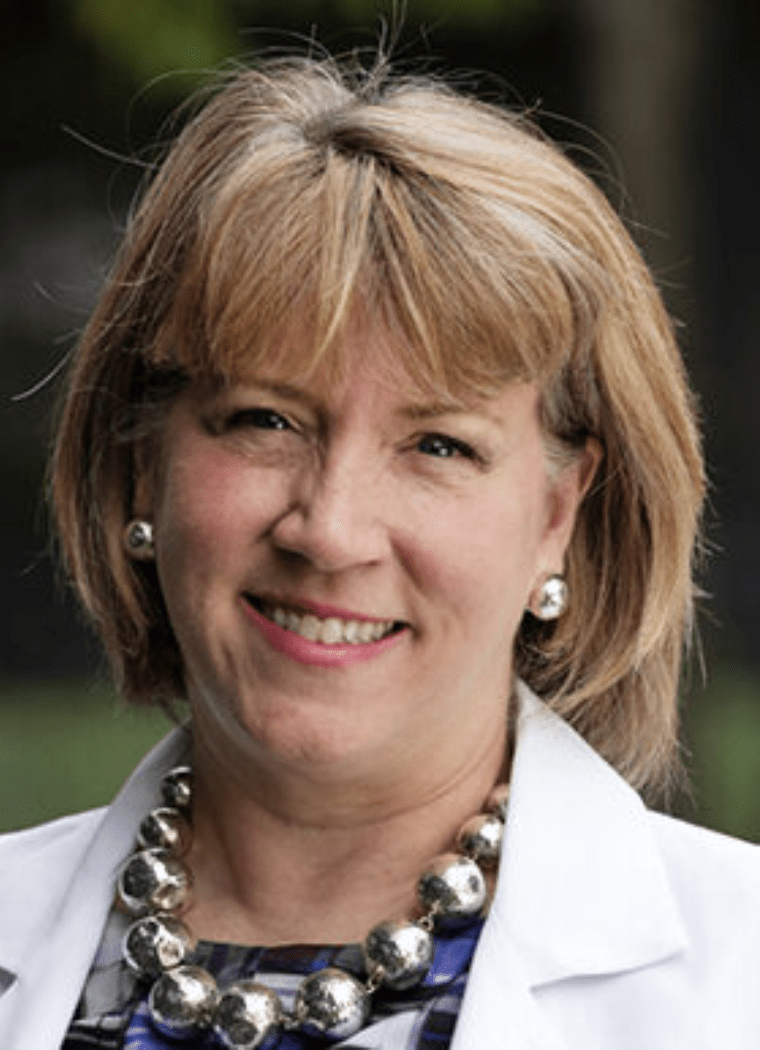
From Valerie Ratts, MD
Welcome to WashU Med and the Dis-O Guide. The Dis-O Guide is written by our students for you and provides a very up-to-date look at our school — its people, its spaces, and its strengths. As you read this guide, you may be an applicant contemplating a big decision about where to attend medical school or a matriculated student moving into your new home, getting accustomed to the Central West End neighborhood, and eager to meet new classmates. Since 1987, the Dis-O Guide has been produced to show you an inside look into WashU Med, our medical students, and the St. Louis region. Hopefully, while reading, you will smile and recognize a part of yourself in the descriptions. The WashU Med vision statement calls for the training of the next leaders in biomedicine in a culture that supports diversity, inclusion, critical thinking, and creativity. Attracting students who will align with the mission and vision is key to our strategic plans. We are committed to providing the knowledge, experiences, resources, and mentorship needed to support our students in the journey to an amazing medical career.
For those still contemplating a decision, this guide will show you some of the possibilities available here. Through the Dis-O Guide, you can learn about our educational mission and the unique aspects of the Gateway Curriculum. Our goal is to prepare and train our students to meet the future challenges of health care and biomedical research. This year’s guide also provides information on how our students thrive in St. Louis.
For those who have made their decision to attend WashU Med, I like the suggestion that the Dis-O Guide will provide “insider advice” to a great medical school and education.
Finally, what advice can I give future medical students? 1) Rely upon the skills and characteristics that have brought you to this point. 2) A positive attitude makes a huge difference. 3) Get to know your classmates. Like you, they are amazing. Many will become lifelong friends and colleagues. 4) Keep your enthusiasm for medicine. You are starting down a pathway that will require diligence, sacrifice, and hard work, but will also bring tremendous reward. Doctors play truly special roles in the lives of people. It is an honor and privilege to practice this profession.
Valerie S. Ratts, MD
Associate Dean for Admissions and Professor of Obstetrics and Gynecology
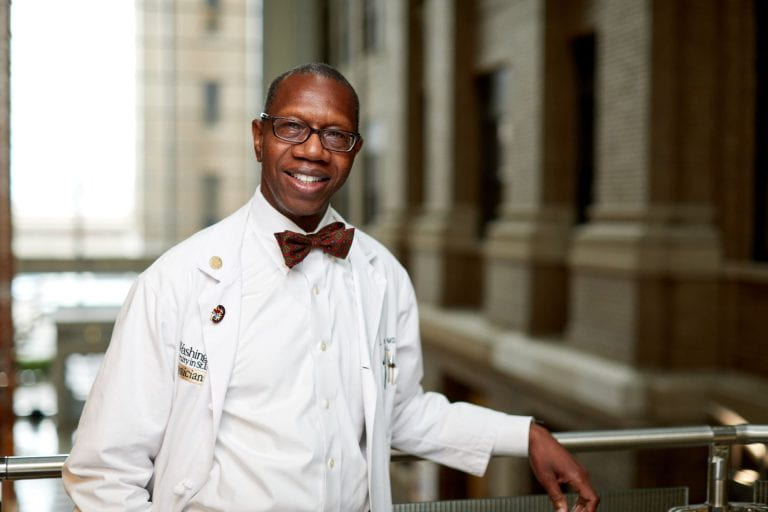
From Will R. Ross, MD, MPH
Welcome to Washington University School of Medicine! You are an elite group of students selected because of your impressive skills, experiences, and attributes, including your scientific curiosity, caring for others, and commitment to service. We need you here, for we in academic medicine are at a pivotal time, when we must reconcile our goal of training empathic practitioners with society’s demand that we fulfill our obligation to keep it healthy. As you enter medical school, you will undoubtedly sense this pull; for as soon as you sit for your first class you will long for the opportunity to address society’s greatest problems. You will be a Phase One student still developing the complement of skills needed to resolve longstanding issues in health care, but you will be able to envision a path forward, by fully embracing the art of medicine along with the science of medicine. As you look among yourselves, you will see assembled a remarkable, diverse group of students who have excelled at the highest level as undergraduates. Over the course of your medical training and into the professional development phase of your career, you will all eventually master the science of medicine. However, as you encounter your first patient, you will soon find that science mastery is insufficient to effect complete healing.
Your patients will not just bring their diagnoses and lists of medications to the medical encounter, they will bring their lives, full of family and caring, pathos, and trauma. You will rely on the art of medicine to navigate your patients’ world, to employ trauma-informed care by asking, “What’s going on in your world?” as opposed to “What’s wrong with you?” You will learn to practice what I call radical empathy, seeing each patient as a loved family member, even as yourself. William Carlos Williams, the noted writer and physician, stated emphatically that in medicine, “peace of mind comes from adopting the patient’s condition as one’s own to be struggled with towards a solution.” Empathy is a gift and a skill; you will be impressed by the remarkable faculty at Washington University School of Medicine who are not just outstanding scientists, clinicians, and educators, but individuals possessive of a radical empathy they will share with you as we collectively respond to the higher calling of medicine.
Empathy is the essence of effective cross-cultural communication. Indeed, our ability to address and resolve longstanding health care disparities in our region involves active listening and responding to community-led and community-based interventions. Through organizations such as Casa de Salud, the International Institute, and the Mosaic Project, you will also learn how to fully engage with our foreign-born and new-American populations to deliver culturally-appropriate care. As you marry the art of medicine with the science of medicine, you will be more equipped to work collaboratively with your colleagues to help heal our region, our nation, and our world. Thanks for your decision to attend Washington University, in St. Louis. We want you, we need you.
Will Ross, MD, MPH
Associate Dean for Diversity
Alumni Endowed Professor of Medicine,
Division of Nephrology